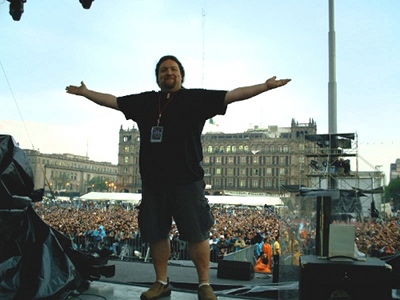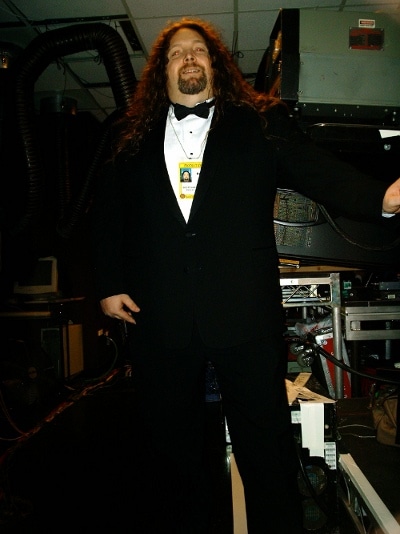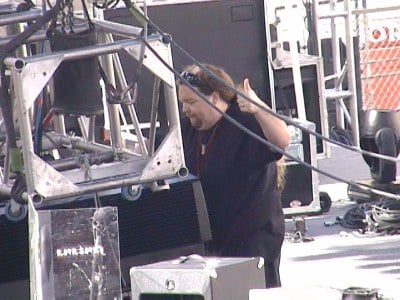
Once again we return to our So You Want My Job series, in which we interview men who are employed in desirable jobs and ask them about the reality of their work and for advice on how men can live their dream.
Behind every great event, is a great video engineer. One like Scott Goegebuer, a highly successful video engineer, projectionist, and technical director who has worked everything from Michael Jackson’s Memorial Service to the Oscars. Scott gives us a fascinating look at this interesting and crucially important behind-the-scenes job. Thanks for the great interview, Scott!
1. Tell us a little about yourself (Where are you from? How old are you? Describe your job and how long you’ve been at it, ect).
I am 45 years old and live in Long Beach, California. I was born and raised in the Pacific Northwest in the foothills of Mt Rainier, about an hour from Seattle, in a little town named Buckley, Washington. I met my wife Tracy as a freshman in high school, and we’ve been together now for over 30 years, 25 of them married, (we had to graduate sigh school before we married) with three children.
In my twenties I was a working bass player in Seattle during the grunge explosion. It was a very exciting time to be in the music business. In my thirties, I eventually thought I should do something serious, since I had two kids at the time. We moved to Southern California in 1993 with a business opportunity, but, due to unforeseen circumstances, that didn’t work out. After a series of some odd jobs, I fell into this. It’s been a successful career for about 14 years now.
I do three main jobs in video: projection, engineer, and camera director/technical director.
I would say 80% of my work is as a projectionist. It’s a very inside job that no one really thinks about. When you go to a concert and see the screens, there is a projectionist there making it look right. If you watch award shows, game shows, or some of the performance type reality shows, (I’ve done The Oscars, Directors Choice Awards, Kid’s Choice Awards, ALMA Awards, “The Next Best Thingâ€, “The Oneâ€, “Rock Star: Supernovaâ€, “20Qâ€, “Stand Up 2 Cancerâ€, etc.) there are big screens all around the set. It’s a good chance I may be running those projectors.
There is more to it than people realize. These things can be huge, and I have to run a crew of stage-hands to get them hung on truss in the right places and be done safely. Then I have a lot of work to make them look right. Whenever you see a screen on TV or in concert, there are actually two projectors pointing at it, perfectly converged into one image. This is for maximum brightness because of stage lights, but getting them perfectly in line with each other, and then matching the colors perfectly and in a timely manner is where I earn my money. I have found out after getting into this that I have a very good eye for color differences.
As an engineer, I put together camera control, cameras, and then during the performance match up colors and constantly ride iris to keep light consistent to the cameras. I have to be able to read scopes to keep them matched. This is very precise. Most of the time for a broadcast a truck comes in with all the gear already built in. It’s kind of like a rolling studio, and they’re pretty fun to work in.
Then as a director I have the most fun. I am the one calling the camera shots, and making the show flow. This is quite creative and rewarding, but also the job with the most pressure.
2. Why did you want to become a video projectionist and engineer? When did you know it was what you wanted to do?
Oddly enough this was never something I planned on doing. I thought I was going to be a rock star. I don’t know anyone who says when they’re a kid, “I’m going to be a video projectionist when I grow up.†I quite honestly just fell into it, and it turned into a great career. The only conscious decision I made was when I was working as a cameraman. I saw that the backstage guys (director, engineer, projectionist) were making quite a bit more money than I was. That’s when the motivated parent part of me kicked in, and I decided to learn as much as I could about the other aspects of video.
It satisfied the part of me that wants creativity, and the part that wants to use my brain, and the part that wants to be a good provider for my family. I’ve become very satisfied with what I do, and look forward to going to work every day. Not many people can say that.
3. If a man wants to become a video projectionist and engineer, how should he prepare? Is it something you can go to school for? Can you apprentice with someone and learn the ropes?
There are multiple ways to get into this business. Some people actually do go to school for this. They take television and film production classes. That’s not a bad way to start because you can get a lot of instruction and information that way.
Also, it’s amazing to me how many people went to film school and are using their knowledge of cameras to work in the live event field to pay bills. They all think they are the next Spielberg and have a script in their backpack. Almost every one of them can’t wait to get out of this business and make their movie and be famous. They really are missing out on how much fun this is. They’ve never learned to live in the moment.
The most common way to get into this is to just contact video production companies and start going to work doing the grunt jobs. That involves building screens, hauling cable, setting up drapes, loading and unloading trucks, and pushing road boxes. If you’re motivated to learn other aspects, work hard and pay attention, there is a lot of opportunity here.
Most people start small. Working in the AV department of hotels is also a good way to learn the basics, Some people like it there and never leave it. I became freelance early on in this process. I never worked for a hotel or a video production company as a staff employee. Those places though, do call me as a freelancer to do work for them.
The bottom line is, as with any level of success, that this is hard work. You have to apply yourself to get better and to get the better jobs. This is not an industry for lazy people.
4. How do you break into the business and start getting gigs to work?
After my business fell by the wayside, I got a job at Starbucks just to make ends meet. I met a regular customer who would come in for a break from editing videos. We spoke and he explained that he basically made video scrapbooks for the recruits at the Los Angeles Police Academy. I thought it sounded interesting and got him to give me a try. I was a natural with a camera. I think it has to do with years of being a musician. I really believe that one art leads to another. We did some work with a gentleman who did projection jobs, and I got him to show me some techniques, and then he started hiring me from time to time doing bar mitzvas. Yes, I did start small. After meeting a few more people, and working hard to learn more, I became freelance and got work from the people I had met as I was learning. Referrals led to referrals, and I was on my way.
Some people never leave the employee part of it like I’ve done, and go freelance. It takes a huge leap of faith and confidence to go to not having a guaranteed paycheck to making your own way.
There is no set way to grow your career. I just jumped on every opportunity that came along. They key to that is to grab that opportunity and make it yours. Don’t be afraid of success! Many people are. Then, when you have proven yourself competent to someone, they may give you a shot with something more complex. Then, you get referred as a guy who can deliver, and then get another referral, and another.
 Working the Oscars.
Working the Oscars.
5. How do you work your way up from working small events to touring with Santana and doing the Oscars?
As I mentioned before, I took every opportunity and made it work. Now, I admit that being in Southern California gives me more chances for good opportunities to come along, but, they are the same ones that other folks here in L.A. get, but don’t take advantage of, or are afraid to turn it into something successful for them.
My shot at the Oscars came from a referral. By this point I had been at it for a number of years. I was doing a lot of Hollywood parties and corporate events. I was doing bigger and bigger shows all the time. The production company doing projection for the Oscars needed a new projectionist and called around to some other companies I had worked for. I have created a pretty good reputation for myself here in L.A. I was given a very good recommendation. I got the job/opportunity and made it work. From all the time I had put in to get better, I had the skill set to be successful.
The Santana tour was also from a good recommendation. The folks I did the Santana tour for also hired me for Michael Jackson’s comeback tour rehearsals. Unfortunately, that never left the Staples Center. If you see the “This Is It†movie, you can see my screens in some of the shots, hanging on either side of the video wall. Right after he passed, I also did the Memorial service. That was the single biggest worldwide broadcast I’ve been involved with (so far). Now, after all that work, I am kind of a known quantity, and I get the calls for the high profile, and rather difficult jobs.
6. How much competition is there in the video engineer business? What separates the guys who can make a successful go of it from those who can’t?
There are a lot of very talented people in this industry, but we really don’t compete with each other much. That is, at least at the high end of shows that I work at. As a matter of fact, we all refer each other for work all the time. We are not union members, we are all freelance, and we all look out for each other.
That being said, I am very selective about who I refer, and so is everyone else. It can hurt your reputation to refer someone who can’t deliver.
The most successful people in this industry follow all of the old fashioned rules.
Know your job, and always improve your abilities. Be professional. Work hard. Always keep your client happy. People skills go a long way; you are your product.
Be honest. This is a big one, if you are a shyster, you can get a reputation that can haunt you forever. Know and understand how important your reputation is. It takes work to cultivate it.
I keep mentioning hard work. There is no substitute. Not just hard work on the job at hand, but hard work to learn more about your craft, hard work to take care of your finances, hard work look out for the next job, hard work to keep clients happy so that they will call you back. I know it gets redundant, but lazy people get weeded out, especially here in Hollywood.
7. What is the best part of your job?
There are a couple of great things about this. One is that there is always a feeling of completion. With other jobs I have had, no matter how good of a job I did today, tomorrow it starts all over again. This business is project to project. When the project is done, you move on to the next one. You have finished. It’s a great feeling. No two are ever exactly the same.
I also get to travel all over the country, and the world, and I get to meet some really great people.
8. What is the worst part of your job?
The travel is a double-edged sword. Seeing other countries is very cool, but leaving the family can be tough. Also the plane rides and lumpy hotel beds can get old quickly. Honestly though, it’s only so bad; there are a lot of worse situations to be in.
 On tour with Santana.
On tour with Santana.
9. What’s the work/family/life balance like?
That can be tricky. It’s hard not to take every bit of work that is offered. Being a freelancer I don’t get vacation days, sick days, or paid health care. It’s all on me, or actually us, because my wife and I are a real team in this. We have really worked out a groove with it. When a project happens, it’s all encompassing sometimes. But when it’s over, I get time at home during the weekdays that other people don’t get. I actually average about a week off a month. Most people do too, when you add up the weekends, I just get them all in a row.
I also don’t live on the road like some people, especially the concert touring guys. I choose this because of my family. I hardly go out for more than two weeks at a time. I have no desire to do a six month rock and roll tour. Hey, I’m 45 and have a family, I’ll leave that to the twenty year old guys to do.
Living and working in SoCal also lets me work near home more than some people who do this in other states. I get to do game shows and award shows and such. For corporate events L.A. is a destination city, so a lot of work comes here.
Also being freelance lets me be in charge of my own time more, and it has afforded me and my family the opportunity to be able to vacation often, and at the times of the year when other people don’t. So really, my wife and I feel the family time has been better than when I had a nine to five.
10. What is the biggest misconception people have about your job?
People think it’s all parties and glamour. Yes, there is glamour, but I work very hard at this. These shows don’t build themselves.
They also don’t understand the level of skill involved. Anyone can point a camera, but a pro makes it look great.
11. Any other advice, tips, commentary or anecdotes you’d like to share?
One of the great side benefits of this is that my children have seen that you don’t have to just work for someone else, or really have a standard “job†to be successful. My two oldest are teenagers and very forward thinkers that want to make their own way. Our family has been able to live on our own time, and in our own way, and I like that.
As far as anecdotes, I could write a book (not a bad idea) if I get started telling stories. I’ve been with presidents, rock stars, sports stars, film and TV stars, and done projects for some of the biggest companies in the world, and I remind myself all the time I just fell into this career by accident. I guess I’ve learned that when an opportunity arises, don’t be afraid of success.
Tags: So You Want My Job

